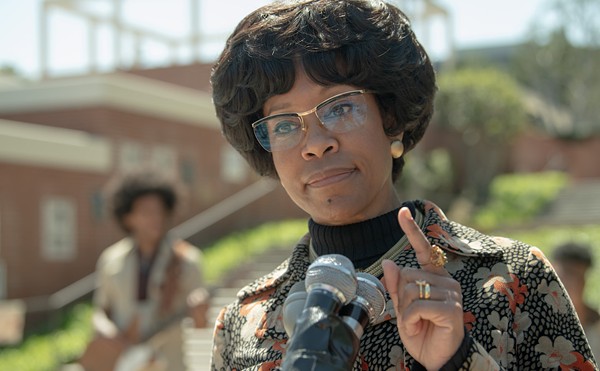Control Room offers a raw behind-the-scenes peek at the politics and practices of the Al-Jazeera news network that has been long vilified by the U.S. government, which has insisted that it is less a news outlet than a terrorist recruiting tool and Osama bin Laden mouthpiece. Secretary of Defense Donald Rumsfeld is seen more than once in the film proclaiming it nothing more than an Arab propaganda machine, and George W. Bush refused to speak to the network when he apologized for the prisoner abuses at Abu Ghraib. They have belittled, ignored and even attempted to censor the network, having once threatened to sever ties with its home country of Qatar if Al-Jazeera didn't use reporters who were "moderate or neutral." They call it "poison" and hope no one in the Middle East or elsewhere will take one more sip.
Noujaim proves that, of course, it's not so simple. What she finds is a network populated by producers and journalists who, like the West, crave something resembling democracy and actually think the Constitution is a mighty good document. Al-Jazeera is not even beloved in the region, having been kicked out of a number of Arabic countries, including Iraq under Saddam Hussein. They're not anti-U.S. so much as anti-war, which doesn't sit well with liberators who became a country's occupiers.
The stars of the film, to use the term liberally, are two Al-Jazeera employees and a Marine stationed at Central Command in Qatar; the three like and understand each other, even if they do not always comprehend one another. Reporter Hassan Ibrahim is a bearish and charming man who went to high school with bin Laden and opposes the American occupation of Iraq. He also went to college in Arizona and followed the Grateful Dead for a year. Senior producer Samir Khader, his hair slicked over to hide a bald spot and his hands always holding a cigarette, says in the film he would go work for the Fox News Channel if they offered him the gig. He also talks of sending his kids to college in the States. They're conflicted, angry and in anguish over the war that has killed more civilians than soldiers, but not so foolish to believe Iraq was a better place with Saddam Hussein in power. As Khader says, he would gladly "exchange the Arab nightmare for the American dream," but at what cost? It's a question left for Marine Captain Josh Rushing to answer, but he'd rather listen than repeat policy; rare is the military man who knows that being on the side of right doesn't always mean being right.
The movie is a product of fortuitous timing and dogged perseverance; Noujaim had to hang out in the Al-Jazeera commissary and beg for access and interviews. She wound up in Qatar just as the U.S. was preparing to invade Iraq in March 2003. Noujaim uses both locations to compare and contrast the coverage, most notably using American journalists who want to show and say more but can't and the Arabic journalists who believe they can't show enough. You almost sense that CNN's Tom Mintier and NBC's David Shuster are jealous of their Al-Jazeera counterparts, especially in a scene in which the American reporters voice their irritation over the military's pushing of the Jessica Lynch rescue on the very day American soldiers were killed and Iraqi women and children were killed by coalition forces. They'll have to lead with the happy tale of heroism, hardly a fair or balanced presentation of life and death during wartime.
Control Room isn't narrated; Noujaim and her crew merely point and shoot and ask the occasional question. The filmmakers offer little context, outside of the day-to-day life of Al-Jazeera's producers and reporters, one of whom is killed when coalition forces attack the network's headquarters in Baghdad. We hear nothing about allegations that Hussein had operatives working at the network; we hear nothing about how American forces bombed Al-Jazeera's Kabul bureau in November 2001. All that noise is left outside, and instead the filmmakers show us what TV viewers in the Middle East have been seeing since the United States rolled into Iraq, and also tell us why.
The movie lingers over images the American media shies away from -- footage of dead children who got in the way of freedom's bullets, soldiers on both sides rendered raw meat in battle -- and dares us to turn away. It puts us in the shoes of men and women for whom the war is not something distant and intangible but a bloodbath in their own backyard, which makes them the very definition of embedded journalists. The movie does not judge either side; it only asks that you consider that there's more than one truth.





